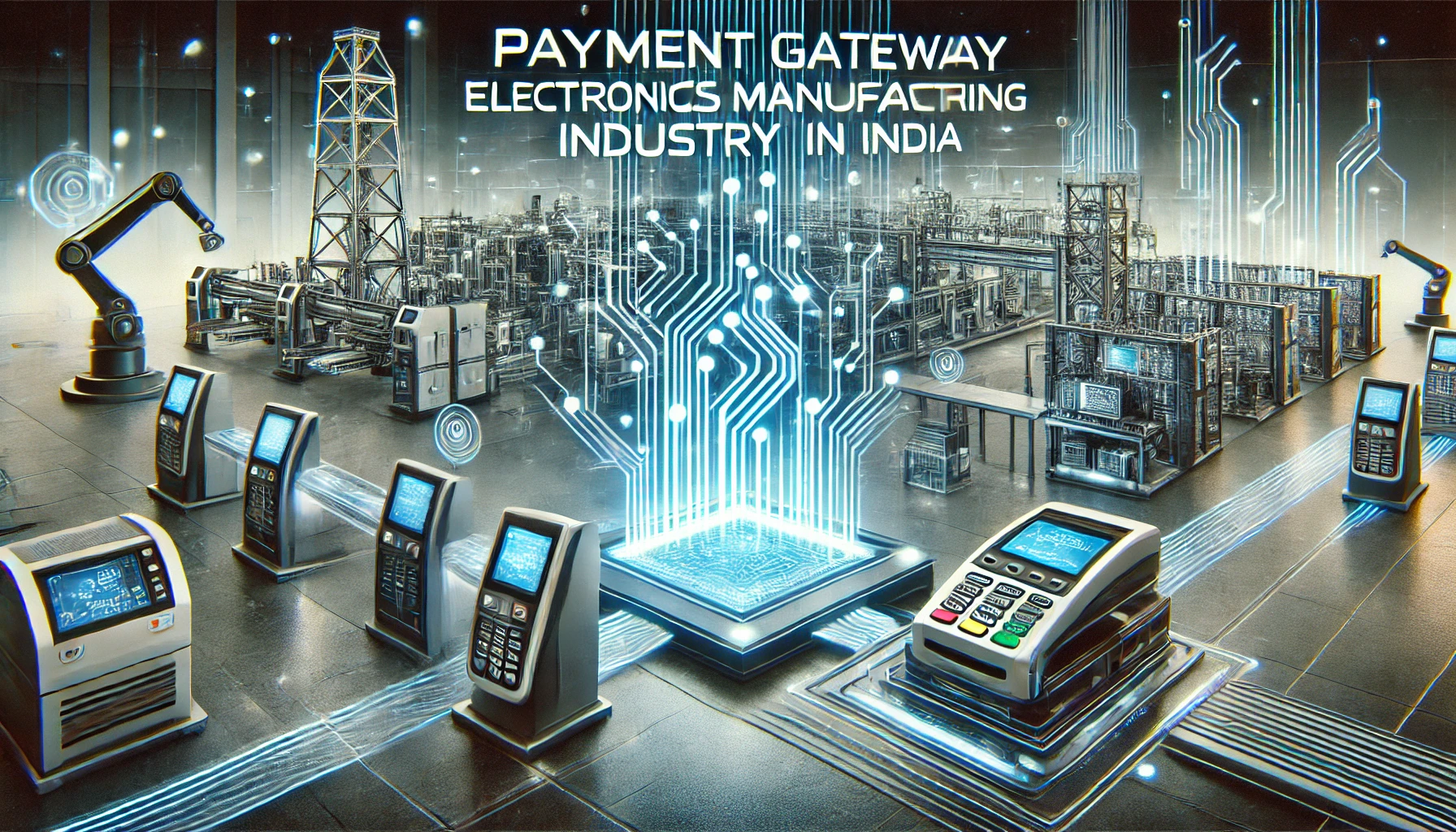AUTHOR : ISTELLA ISSO
Introduction
The electronics manufacturing industry in India has experienced significant growth in recent years, driven by factors such as technological advancements, government initiatives, and a growing domestic market. With the push towards digitalization, payment gateways have emerged as essential tools for streamlining financial transactions and improving operational efficiencies in the sector. By offering secure and swift payment options, payment gateways are transforming how businesses in the electronics manufacturing sector operate.
What Is a Payment Gateway?
A payment gateway technology that facilitates online transactions between buyers and sellers. It acts as a bridge that securely processes credit/debit card payments, net banking, and other electronic payments, ensuring that the transaction data is encrypted and safe from fraud.
Types of Payment Gateways
- Hosted Payment Gateway These redirect customers to a third-party website for payment processing. Examples include PayPal and Razorpay. They are easy to implement and secure, but customers leave the merchant’s website temporarily during the transaction.
- Non-Hosted Payment Gateway These allow payments to be processed directly on the merchant’s website. They offer a seamless user experience but require stronger security measures to protect sensitive data.

The Role of Payment Gateways in the Electronics Manufacturing Sector
Facilitating B2B Transactions
Payment gateways streamline B2B transactions by providing secure, fast, and reliable payment solutions for large-scale orders. They support bulk payments, Electronics manufacturing services[1] multiple currencies, and various payment methods, making it easier for manufacturers to handle transactions with suppliers and distributors. This efficiency reduces delays and ensures smooth financial operations in the supply chain.
Enabling Global Trade
Payment gateways play a vital role in supporting global trade by facilitating cross-border transactions seamlessly. They handle multiple currencies, offer automated currency conversion, and ensure compliance with international payment regulations. Electronics industry[2] This allows manufacturers to collaborate with overseas clients and suppliers efficiently, fostering global business growth.
Improving Operational Efficiency
Payment gateways automate and streamline the payment process, reducing the need for manual intervention and paperwork. This minimizes errors, accelerates transaction times, and integrates seamlessly with inventory and order management systems. By simplifying financial operations, manufacturers Electronics companies[3] focus on core activities, enhancing overall productivity and efficiency.
Benefits of Payment Gateways in Electronics Manufacturing
Faster Transactions
Payment gateways significantly accelerate the speed of transactions by enabling instant payment processing. Unlike traditional methods like bank transfers or checks that take days to clear, digital payments are completed in seconds. This speed not only improves cash flow but also ensures smoother operations and faster order fulfillment in the electronics manufacturing industry[4].
Enhanced Security
Payment gateways use advanced encryption and security protocols to safeguard sensitive financial data during transactions. They also incorporate fraud detection systems to monitor and block suspicious activities in real-time. This ensures that manufacturers can conduct transactions confidently, minimizing risks of cyberattacks or data breaches.
Reduced Risk of Fraud
Payment gateways incorporate robust fraud detection tools, such as real-time monitoring and AI-driven analysis, to identify and block suspicious activities. They use tokenization and encryption to protect sensitive data, ensuring that transactions are secure. This significantly reduces the chances of unauthorized payments or financial fraud in the manufacturing sector[5].
Improved Cash Flow Management
Payment gateways provide real-time tracking of transactions, enabling manufacturers to monitor incoming and outgoing payments with ease. This transparency helps businesses plan and manage their cash flow more effectively. By reducing payment delays and ensuring faster settlements, they contribute to better financial stability and decision-making.
Integration of Payment Gateways with ERP Systems
In large-scale manufacturing operations, integrating payment gateways with Enterprise Resource Planning (ERP) systems can create significant efficiencies. Payment gateways can automatically update payment statuses in the ERP system, eliminating the need for manual intervention and reducing the risk of errors. This integration also allows for better forecasting and financial planning.
Challenges of Using Payment Gateways in Electronics Manufacturing
Technical Issues and System Downtime
Payment gateways, like any digital system, can face technical glitches or server downtimes, disrupting transaction processes. These issues can delay payments, impact cash flow, and stall operations in the manufacturing sector. To mitigate this, businesses must choose reliable gateways with robust support systems and contingency plans.

Cybersecurity Threats
Payment gateways are potential targets for cyberattacks, including data breaches, phishing, and malware attacks. These threats can compromise sensitive financial information and disrupt business operations. To combat this, manufacturers must implement gateways with advanced security features like encryption, tokenization, and multi-factor authentication, ensuring safe and secure transactions.
Limited Awareness and Adoption
Many small and medium-sized electronics manufacturers in India may not be fully aware of the benefits of payment gateways or how to integrate them into their operations. This lack of awareness can hinder adoption, leaving these businesses reliant on outdated payment methods. To overcome this, education and training on the advantages of digital payment solutions are crucial for encouraging broader usage.
Emerging Trends in Payment Gateways for Electronics Manufacturing
Mobile Payment Solutions
Mobile payment solutions are increasingly popular in the electronics manufacturing sector, offering convenience and flexibility. These solutions allow transactions to be completed via smartphones or mobile apps, making it easier for manufacturers and clients to make payments on the go. With the rise of mobile wallets and QR code-based payments, businesses can improve cash flow and streamline payment processing.
Blockchain Technology
Blockchain technology offers a secure and transparent way to process payments by recording transactions in a decentralized ledger. This reduces the need for intermediaries, lowers transaction costs, and enhances security by preventing fraud. In the electronics manufacturing industry, blockchain can ensure quicker, more reliable payments while maintaining transparency across the supply chain.
AI and Machine Learning Integration
AI and machine learning are transforming payment gateways by enabling smarter transaction processing. These technologies analyze payment patterns, predict potential issues, and detect fraudulent activities in real time. By automating fraud detection and optimizing payment processes, AI and machine learning help manufacturers enhance security, improve customer experiences, and reduce operational costs.
The Future of Payment Gateways in India’s Electronics Manufacturing Industry

Government Initiatives and Digital Payment Policies
The Indian government has actively promoted digital payments through initiatives like Digital India and the introduction of the Unified Payments Interface (UPI). These policies aim to encourage cashless transactions and make digital payment systems more accessible. By providing a secure and efficient payment infrastructure, the government is helping businesses in the electronics manufacturing sector adopt digital solutions, streamlining payments and fostering economic growth.
Increasing Adoption of Cashless Payments
The adoption of cashless payments is steadily rising in India, driven by the convenience, speed, and security they offer. With a growing number of businesses, including those in the electronics manufacturing sector, embracing digital payment solutions, transactions are becoming faster and more efficient. This trend is reducing dependency on traditional cash payments, enabling manufacturers to manage finances more effectively and enhancing overall business operations.
The Role of Fintech Startups
Fintech startups are playing a crucial role in transforming payment systems within the electronics manufacturing sector. These innovative companies are introducing cost-effective, tailored payment gateway solutions that address the specific needs of manufacturers. By offering flexible, scalable, and user-friendly platforms, fintech startups help businesses streamline payments, enhance security, and stay competitive in a rapidly evolving market.
Case Studies: Successful Implementation of Payment Gateways
Example 1: Leading Electronics Manufacturer in India
A prominent electronics manufacturer in India integrated a payment gateway to handle both domestic and international transactions. By doing so, they significantly improved their cash flow and reduced payment processing time. The use of secure, real-time payments also enhanced their relationships with global suppliers and customers. As a result, the company experienced smoother financial operations, quicker order fulfillment, and increased customer satisfaction, positioning themselves as a competitive player in the global market.
Example 2: Small to Medium-Sized Enterprises (SMEs)
A small electronics manufacturer adopted a non-hosted payment gateway solution, which helped reduce payment delays and improve customer satisfaction. This implementation proved to be cost-effective and scalable as the company grew.
Conclusion
The integration of payment gateways into the electronics manufacturing industry in India has brought about significant improvements in transaction speed, security, and operational efficiency. With emerging technologies and government support, the sector is poised for even greater adoption of digital payment systems, enhancing its competitiveness in the global market.
FAQs
- What is the importance of payment gateways in the electronics manufacturing sector? Payment gateways facilitate secure, fast, and efficient financial transactions between manufacturers and their clients, both domestically and internationally.
- How do payment gateways enhance security in electronic transactions? Payment gateways use encryption technologies to protect sensitive transaction data and implement fraud detection systems to prevent unauthorized access.
- What are the main challenges in adopting payment gateways? Challenges include technical issues, cybersecurity threats, and limited awareness among small manufacturers.
- How do mobile payment solutions affect the electronics manufacturing industry? Mobile payments offer greater flexibility and convenience, allowing manufacturers and buyers to conduct transactions via smartphones or apps.
- Will payment gateways continue to evolve in the future? Yes, as technologies like blockchain, AI, and machine learning become more integrated into payment systems, we can expect payment gateways to become more secure, intelligent, and efficient.

